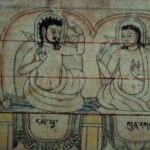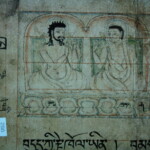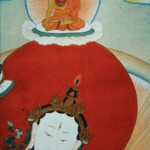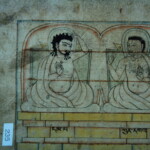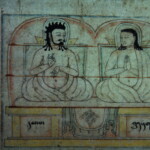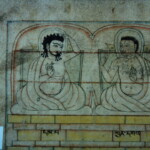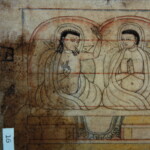Five-volume Tibetan text, with introduction by Barbara Nimri Aziz, 1979 originally published in Bhutan.
Among treasured documents carried form Tibet with refugees was a three volume illustrated, illuminated manuscript record of the teachings of Pha Dampa Sangyas, the 12 C. Black Yogi, originator of Zhi-je philosophy and practice, arrived in Tibet from India. Though famed, his center was a modest retreat at Dingri Lankgor where the manuscript was housed.
Aziz research into Dingri history and the story of the Langkor Nangten (relics), an orally transmitted account of PhaDampa’s history, led to a more extensive project culminating in the reproduction of this treasured text. Anthropologist Aziz, fluent in Tibetan, had several years of association with Thupten Choeling Monastery (and nunnery) in Solu-Khumbu, Nepal. Trusted by Trulshik Rinpoche the revered abbot, he invited her to photograph (on 35 mm film stock) the complete manuscript extending to hundreds of pages, an exercise undertaken in the monastery courtyard over the course of many weeks and under his attentive care.
The eminent Tibetologist E. Gene Smith confirmed the value of the text and worked with Aziz to have her photographic document copied, edited, then printed in Bhutan. Smith invited Aziz to prepare a short English introduction for inclusion in volume one of the five volumes in the traditional Tibetan format.
The original manuscript is safely hidden, while many reproductions of the original photographed copy are widely distributed, translated, and made available to scholars and Buddhist students. Among Aziz’ original photographs are close-ups of illustrations within the text, which we make available to readers.
Photos
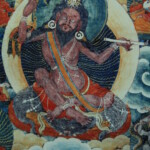
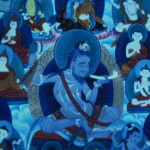
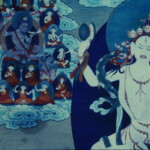
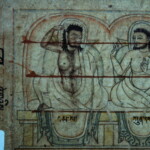
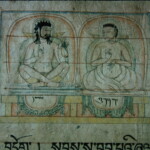
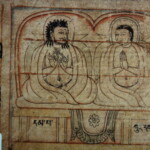
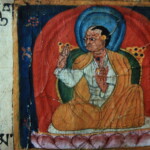
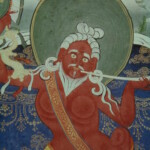
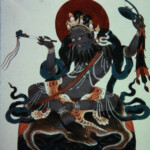
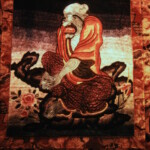


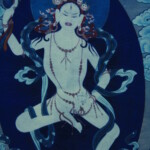
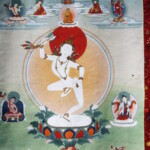
Excerpts
Excerpts (passages 1,2,3 and 22-26) from Pha Dampa’s hundred verses of advice to the people of Dingri (Tingri) from a recent translation
Homage to the teacher!
Fortunate practitioners gathered here in Tingri, listen!
Just as worn-out clothes can never again be made as new,
It’s no use seeing a doctor once you’re terminally ill;
You’ll have to go. We humans living on this earth
Are like streams and rivers flowing toward the ocean –
All living beings are heading for that single destination.
Now, like a small bird flying off from a treetop,
I, too, will not be here much longer; soon I must move on.
1
If you spend the present meaninglessly and leave with empty hands,
People of Tingri, a human life in the future will be very hard to find.
2
To apply yourselves with body, speech and mind to the sacred Teachings,
People of Tingri, is the best thing that you can do.
3
Give your very life, heart and soul to the Three Jewels [the Buddha, the Dharma, and the Sangha],
People of Tingri, and their blessings cannot but arise.
…………………………….. ………………………….
22
Your never-failing source of refuge is the teacher;
People of Tingri, carry him constantly on the crown of your head.
23
If your protection is the teacher, you’ll reach wherever you aspire to go;
People of Tingri, cultivate devotion as the fare you pay for the journey.
24
Those who get wealthy get miserly too;
People of Tingri, give generously without being partial.
25
Whoever gets power acts sinfully, too;
People of Tingri, abandon all desire for rank and power.
26
Those with rank and riches are never happy and at ease;
People of Tingri, get ready to claw at your chest in anguish.
Related Articles
APRIL 7, 2017, Counterpunch.org “Back in government hands”; the journalist repeated it twice in the same account of her report from Homs, Syria. Lyse Doucet…
AUGUST 28, 2017, Counterpunch.org Syria’s current struggle against multiple assaults is not over by any means. It remains in a highly vulnerable state. Its people…
APRIL 16, 2018, Counterpunch.org When will you get the message? Comply, as Jordan, Egypt and others did and we’ll protect your leaders, ensure favorable press,…
Among the Indian siddha who made their way across the Himalayas into Tibet almost a millennium ago is the dark one called Pha Dampa Sangye…
Pha Dampa Sangyas was the son of an Indian Brahmin couple who grew up in that most holy of lands many centuries ago (~1050-1117?). From…
[Re-print August 12, 2017 on Global Research, originally published in 1978] Aama disappears into the darkened house to light the fire. Flames ignite from hot…

